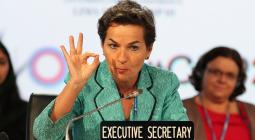World is in danger of missing Paris climate target, summit is warned.

Minister tells more than 80 world leaders that not enough is being done.
The world is still not on track to fulfil the 2015 Paris climate agreement, the UK’s business secretary Alok Sharma warned, after a summit of more than 70 world leaders on the climate crisis ended with few new commitments on greenhouse gas emissions.
Sharma said: “[People] will ask ‘Have we done enough to put the world on track to limit warming to 1.5C and protect people and nature from the effects of climate change?’ We must be honest with ourselves – the answer to that is currently no.”
He said progress had been made at the Climate Ambition Summit, co-hosted by the UK, the UN and France, marking five years since the Paris accord was adopted. More than 80 world leaders including China’s Xi Jinping, the European commission president Ursula von der Leyen, and Pope Francis urged swifter action on the climate crisis.
But while Xi reaffirmed China’s target of net-zero emissions by 2060, he gave few new details of reductions in the next decade. India also disappointed observers when the prime minister, Narendra Modi, vowed to “exceed expectations” in curbing carbon dioxide by the centenary of Indian independence in 2047, but made no pledge on coal production.
Sharma will be president of the next round of UN climate talks, called Cop26, to be hosted by the UK next year in Glasgow, postponed from this November. He urged more countries to come forward with plans before Cop26 to reach net-zero emissions by mid century, and cut emissions substantially in the next decade, to fulfil the Paris agreement.
“The choices we make in the year ahead will determine whether we unleash a tidal wave of climate catastrophe on generations to come,” he said. António Guterres, secretary-general of the UN, called on all world leaders to declare a state of climate emergency, as 38 countries have already done.
Many countries are also pouring money into high-carbon activities as they strive to recover from the coronavirus crisis, with G20 countries spending 50% more in stimulus packages on fossil fuels than low-carbon energy. “This is unacceptable,” he said. “The trillions of dollars needed for Covid recovery is money that we are borrowing from future generations. We cannot use these resources to lock in policies that burden future generations with a mountain of debt on a broken planet.”
The US was not represented, as Donald Trump’s administration shunned the meeting, but president-elect Joe Biden issued a statement promising to hold a major event on the climate in his first 100 days in office.Boris Johnson, the UK prime minister, pledged on Friday to end UK taxpayer funded support for fossil fuel projects overseas, after months of pressure from green campaigners. About £21bn of such funding has been provided in the last four years.
Campaigners agreed with Sharma’s assessment that the summit had not produced sufficient clear new commitments to fulfil the Paris agreement.
Tim Gore, head of climate policy at Oxfam, said: “The Climate Ambition Summit lacked real ambition. World leaders must step up in the next 12 critical months to pull the world back from the brink of catastrophic climate change. Commitments to near-term emissions cuts are still insufficient to limit warming to the 1.5C Paris goal… We must not stumble from Covid-19 disaster into climate calaimity.”
Mohamed Adow, director of climate and energy thinktank Power Shift Africa, said: “New and improved national climate pledges would be a fitting fifth birthday present for the Paris agreement, and a sign to the world’s vulnerable people that leaders are listening and acting to tackle the climate crisis… More and more countries are setting net-zero emission dates. But it’s one thing to set a net-zero date for decades into the future and another thing to enact policies right now that will get us there. That is what must be on the agenda for all countries in 2021.”
Under the Paris agreement, countries are bound to keep global temperature rises well below the 2C above pre-industrial levels that scientists regard as the outer limit of safety, with an aspiration to limit global heating to 1.5C, which should avoid the worst of the ravages of climate breakdown.
However, the commitments to reduce emissions that countries made at Paris were insufficient, and would result in catastrophic heating of more than 3C.
The agreement contains a ratchet mechanism by which nations must update their commitments every five years. The first deadline is now looming, on December 31, and at Saturday’s summit world leaders are supposed to come forward with strengthened plans, called nationally determined contributions (NDCs), to cut emissions by 2030.
The UK has come forward with a goal of cutting emissions by 68% by 2030, compared with 1990 levels. The EU on Friday confirmed its pledge of a 55% cut by 2030.
Many other countries, including China, Japan and South Korea, have come forward with longer term goals of reaching net zero emissions by 2050 or 2060.
John Murton, the UK’s envoy for Cop26, said in a tweet: “[This is] the new benchmark we’re seeking from G20 states: a clearly dated net-zero target with a 2030 NDC aligned to deliver it. Hope all G20 states deliver this for Cop26.”
Countries including Australia, Brazil, Russia and Saudi Arabia were excluded from speaking at the summit as they failed to come forward with strong new commitments.
Kat Kramer, climate policy lead at the charity Christian Aid, said: “Although we saw more than 70 world leaders making new commitments that still leaves many more that are yet to do so. It’s shameful that countries like Russia, Saudi Arabia and Australia have so far failed to come forward with new pledges and risk catastrophe for themselves and vulnerable communities around the world.”
12 December 2020
The Guardian







